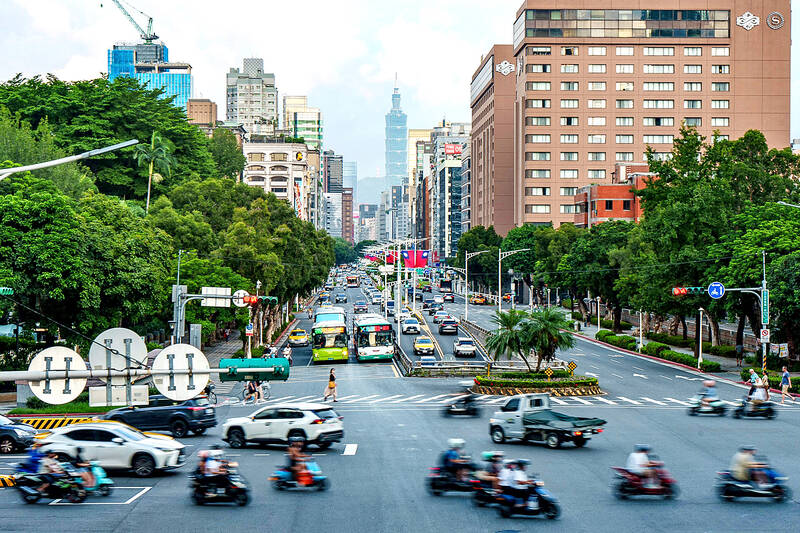Taiwan’s consumer confidence index (CCI) this month edged up 0.09 points from last month to 77.84, gaining for five months and hitting the highest level since March 2020, a survey conducted by the National Central University (NCU) showed on Friday.
Of the six component measures, the readings on the economic outlook, household income, consumer prices, the job market and purchases of durable goods all picked up, in line with positive economic data, NCU Economic Research Center director Dachrahn Wu (吳大任) said.
Investment sentiment in the local stock market turned out to be the only sub-index with a downtrend, as the TAIEX moved sideways earlier this month, before the US Federal Reserve cut interest rates by 50 basis points on Sept. 18.

Photo: AFP
Wu said overall confidence was mainly driven by stable demand in the domestic market as well as wage hikes in some industries facing labor shortages.
The NCU surveyed 3,142 adults aged 20 and above by telephone between Sept. 18 and 21, it said.
The survey showed little change in home-buying intentions, despite the central bank introducing mortgage restrictions on Sept. 19 to curb real-estate speculation.
The real-estate purchase index, which was compiled by NCU along with Taiwan Realty Co (台灣房屋), rose 0.4 points this month from the previous month.
Taiwanese would need to provide a downpayment of 50 percent to 70 percent when buying homes if they already own real estate, even if that ownership is partial or fragmented as a result of inheritance, the central bank said.
People with real demand might feel more comfortable buying homes as house investors and speculators fled the market, making house prices more reasonable, Wu said.
It is better to wait a while longer before passing judgement on the matter, he said.

SETBACK: Apple’s India iPhone push has been disrupted after Foxconn recalled hundreds of Chinese engineers, amid Beijing’s attempts to curb tech transfers Apple Inc assembly partner Hon Hai Precision Industry Co (鴻海精密), also known internationally as Foxconn Technology Group (富士康科技集團), has recalled about 300 Chinese engineers from a factory in India, the latest setback for the iPhone maker’s push to rapidly expand in the country. The extraction of Chinese workers from the factory of Yuzhan Technology (India) Private Ltd, a Hon Hai component unit, in southern Tamil Nadu state, is the second such move in a few months. The company has started flying in Taiwanese engineers to replace staff leaving, people familiar with the matter said, asking not to be named, as the

The prices of gasoline and diesel at domestic fuel stations are to rise NT$0.1 and NT$0.4 per liter this week respectively, after international crude oil prices rose last week, CPC Corp, Taiwan (台灣中油) and Formosa Petrochemical Corp (台塑石化) announced yesterday. Effective today, gasoline prices at CPC and Formosa stations are to rise to NT$27.3, NT$28.8 and NT$30.8 per liter for 92, 95 and 98-octane unleaded gasoline respectively, the companies said in separate statements. The price of premium diesel is to rise to NT$26.2 per liter at CPC stations and NT$26 at Formosa pumps, they said. The announcements came after international crude oil prices

SinoPac Financial Holdings Co (永豐金控) is weighing whether to add a life insurance business to its portfolio, but would tread cautiously after completing three acquisitions in quick succession, president Stanley Chu (朱士廷) said yesterday. “We are carefully considering whether life insurance should play a role in SinoPac’s business map,” Chu told reporters ahead of an earnings conference. “Our priority is to ensure the success of the deals we have already made, even though we are tracking some possible targets.” Local media have reported that Mercuries Life Insurance Co (三商美邦人壽), which is seeking buyers amid financial strains, has invited three financial

CAUTION: Right now, artificial intelligence runs on faith, not productivity and eventually, the risk of a bubble will emerge,’ TIER economist Gordon Sun said Taiwanese manufacturers turned more optimistic last month, ending a five-month streak of declining sentiment as concerns over US tariffs, currency volatility and China’s overcapacity began to ease, the Taiwan Institute of Economic Research (TIER) said yesterday. The manufacturing business confidence index rose 1.17 points from June to 86.8, its first rebound since February. TIER economist Gordon Sun (孫明德) attributed the uptick to fading trade uncertainties, a steadier New Taiwan dollar and reduced competitive pressure from Chinese producers. Taiwan’s semiconductor industry is unlikely to face significant damage from Washington’s ongoing probe into semiconductors, given the US’ reliance on Taiwanese chips to power artificial